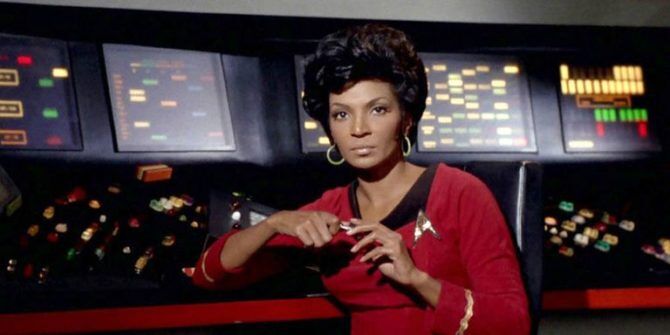
Call it the Butterfly Effect: Sometimes a single act of courage can change the world.
As the nation remembers the civil rights icon Dr. Martin Luther King, Jr., his contribution to future struggles for equality—including that of LGBTQ folks—deserves recognition.
King may not have intended as much when he sat down with an actress-supporter back in 1967, but in doing so, he helped create a Black gay icon who would inspire a generation.
Your dose of fabulosi-TEA
Subscribe to our newsletter for your front-row seat to all things entertainment with a sprinkle of everything else queer.
Join us on this journey…
Spring 1967
Actress/activist Nichelle Nichols becomes one of the most visible women of color in the world thanks to her role as Lt. Uhura on Star Trek. Dissatisfied with her character’s lack of development, she intends to leave the series and return to theatre. Dr. King, an avowed Trek fan, makes a personal appeal to Nichols at an NAACP dinner to stay on the show, as her visibility will give her role model status to young people of color. King adds that he encourages his own daughters to watch the show for that very reason. Nichols agrees to stay on the series.
1969
Star Trek gets canceled and finds new life in syndication. Uhura remains a beloved role model for viewers, inspiring young fans to have greater life aspirations. A young girl named Whoopi Goldberg decides to pursue a career in film, while a fan named Barack Obama admires Uhura’s role as a leader. Uhura’s fashion sense, rippling abs, and strong personality make her popular with queer audiences as well.
1974
So-called fan “slash” fiction emerges, depicting Star Trek characters as explicitly gay. The popularity of the fan fiction helps cement Trek‘s gay and lesbian audiences and raises Uhura’s profile as an icon.
1976
NASA taps Nichols to become a recruiter for the space agency. She decides to focus on bringing women and people of color into the fold.
1978
A Trek fan named Sally Ride joins NASA on the basis of her love of Uhura. Ride also happens to be lesbian.
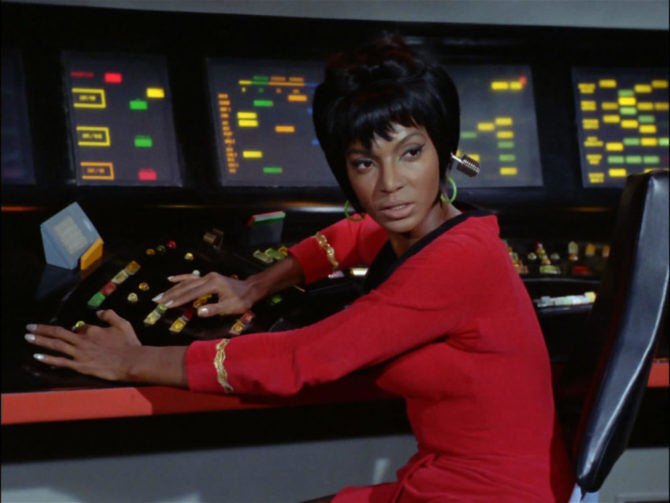
1979
Star Trek: The Motion Picture arrives in cinemas, reigniting interest in the show.
1983
Ride becomes the first American woman and the first LGBT person in space, flying aboard the Space Shuttle Challenger. She repeats the feat in 1984. She again cites her love of Uhura as her reason for joining NASA.
2005
Nichols’ co-star George Takei follows her example as an activist, coming out as a gay man. He becomes one of the leading advocates for marriage equality in the United States.
2008
Embracing her role as a gay icon, Nichols delivers an address commemorating the National Day of Silence and advocating equal rights. She cites Dr. King as a role model for all people striving for justice.
2016
Paramount trumpets the first gay character in Star Trek history by making Sulu ostensibly gay in Star Trek Beyond, courtesy of a hug he shares with a man. Fans roll their eyes, and the movie gets slammed for coping out on the issue.
2017
Star Trek finally gets its first real out-gay characters: Hugh and Paul on Star Trek: Discovery.
Today
Uhura & Nichols remain two of the most important figures in sci-fi history for their acting, leadership and role in inspiring women, people of color, and LGBT folks to reach for the stars.






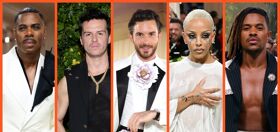



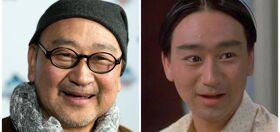




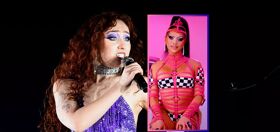


Ummmm Yeah
She publicly said back then theater was much more prestigious than TV so she wanted to go back to theater for that reason. It had nothing to do with character development. He did encourage her to stay though. And the second place you are wrong is about King supporting gay rights. He did not at all. He was a black bapist preacher in the 60’s. And no he probably wouldn’t have changed that view. The rest of the black bapist preachers haven’t.
Kangol
Rev. Dr. King’s widow, Mrs. Coretta Scott King, supported LGBTQ equality and inclusion for more than 20 years before her death in 2006. She was quite outspoken at a time when many major white political and cultural figures were silent.
Also, one of the first presidential candidates to openly support same-sex marriage was Rev. Al Sharpton, back in 2003-4. None of the white Democrats save Dennis Kucinich and certainly George W. Bush pro-same sex marriage. Bush even ran against same-sex marriage as did the GOP. Also, quite a few Black major black ministers support gay people and same-sex marriage and have stated this publicly. Did you miss that?
You regularly express negative comments about black people, but you often seem to go silent whenever there’s a Queerty article about white anti-gay Christians, and there are many out there who actively harm LGBTQ people. Why are you so silent about them?
Bob LaBlah
Kangol, surely you know about the support Dr. King received from the Mattachine Society back in those days. Why didn’t you mention it? Mrs. King came from the old school and she didnt forget those who supported. I won’t go any further because once again my comments are being deleted but for those of you who want to know about it should google it.
DCguy
This is what anti-lgbt, Pro-Trump trolls do. They will lie about a part of the story to try to negate anything that is about fighting racism or bigotry.
If what you claim is true, and this incident with MLK never happened, you are free to post a link with your evidence. But the Washington Post seems to disagree with you.
https://www.washingtonpost.com/news/arts-and-entertainment/wp/2015/07/31/how-martin-luther-king-jr-convinced-star-treks-uhura-to-stay-on-the-show/?utm_term=.5af74047d561
mhoffman953
Martin Luther King Jr did tell a gay man struggling with being gay that he needs to see a psychiatrist to help cure him of this
DCguy
Notice how after (Ummmm Yeah) was called on his lie, that he tries to insert another distraction, again without any link proving it?
Wow, you anti-lgbt trolls are really really REALLY bad at what you do.
mhoffman953
@DCguy
As I checked back on this comment thread to see if anyone responded to me, you comment struck me as odd. Are you alleging that UmmYeah and I are the same person?
I ask that because you say UmmmYeah inserted “another distraction” just a few minutes after I commented and I don’t see any comments from UmmmYeah (unless his comment was deleted and I missed it).
Are you claiming that my comment is a distraction? And if so, a distraction from what exactly?
mhoffman953
@Juanjo
You seem awfully bent out of shape over my comment to the point that you again broke Queerty’s comment policy by resorting to name calling and insults. I’m not sure if you can respond without resorting to name calling, but maybe one day you’ll prove me wrong
However, to brush off King’s comments as just a sign of the times with your statement that, “In January 1958, the prevailing view in the medical community was that homosexuality was a form of illness which was treatable”, seems like an excuse for King’s ignorantly bad comment.
During the civil rights era, many people felt blacks and whites should use separate water fountains and bathrooms. If someone was in agreement with that view at the time, I doubt you’d brush it off now as saying, “oh well, that was the prevailing view at the time”. Nothing wrong with admitting that King’s comments were ignorant.
Juanjo
Miss Hoffman – despite your attempts to mansplain away your ignorance, the fact is the advice given in 1958 was the prevalent scientific position on homosexuality. As I pointed out, Dr. King did not attack the young man, condemn him to hell or anything similar which was the common practice back then. I am not going to condemn King for acting as he did at that time. He had no information available to him to show him differently.
In addition, as you so studiously ignored to mention, one of MLK’s closest advisors during the civil rights struggle was an openly gay man, Bayard Rustin. Both people inside the civil rights movement and outside criticized King for his association with Rustin. J Edgar Hoover and Strom Thurmond attacked him publicly. Rustin, in the March 1987 edition of the Advocate magazine, discussed the attacks made on him and stated that King was not personally intolerant of homosexuality. They stayed friends until King’s death and consulted on strategy for the movement.
You took Dr. Kind’s comments out of context and condemn him for the false cast you put on them. Pathetic.
Blackceo
@Kangol….I notice you didn’t get a response on him after calling out his clear bias. I swear….even an article about MLK Jr turns into a sh*t show. But, par for the course around these parts.
mhoffman953
@Juanjo
“despite your attempts to mansplain”
Um….are you aware of what “mansplain” is considered to mean? It’s what people say when a man explains something to a woman. You’re saying my comment (I’m a man by the way) was my attempt at “mansplaining” to you. That would only be true if you’re a woman and from your profile photo, I don’t think you are.
However, if you’re telling me that you’re a woman then I guess, maybe you used “mansplain” in the correct context.
DCguy
mhoffman953 stated……
@DCguy
As I checked back on this comment thread to see if anyone responded to me, you comment struck me as odd. Are you alleging that UmmYeah and I are the same person?
———————-
Sweetie, we’ve been “Alleging that for ages now. You’ve complained about it once or twice. But it’s cute that you pretend not to remember.
Juanjo
Miss Hoffman – nice dodge but really girl, do stay on point. The fact is the advice given in 1958 was the prevalent scientific position on homosexuality. As I pointed out, Dr. King did not attack the young man, condemn him to hell or anything similar which was the common practice back then. I am not going to condemn King for acting as he did at that time. He had no information available to him to show him differently. As I pointed out the first study showing that homosexuals were not all mentally ill was published a couple months prior to this letter being published.
In addition, as you so studiously ignored to mention, one of MLK’s closest advisors during the civil rights struggle was an openly gay man, Bayard Rustin. Both people inside the civil rights movement and outside criticized King for his association with Rustin. J Edgar Hoover and Strom Thurmond attacked him publicly. Rustin, in the March 1987 edition of the Advocate magazine, discussed the attacks made on him and stated that King was not personally intolerant of homosexuality. They stayed friends until King’s death and consulted on strategy for the movement. That all took place in the 1960s after the letter was published.
You took Dr. King’s comments out of context and condemn him for the false cast you put on them. Pathetic.
Cylest Brooks
I’m just going to kindly remind everyone here to keep your comments focused on the issue at hand and not directed at your fellow commenters. This convo is heated and getting dangerously close to violating the comment policy. I do not want to have to delete all of this important work that y’all are putting into this… but I will if a line gets crossed.
Cylest Brooks
@Juanjo,
mhoffman953 has told you many times that he doesn’t like when you call him Miss Hoffman. It’s unnecessary and mean-spirited, which is a violation of the comment policy.
Future comments referencing him as such will be deleted.
Thanks for understanding!
russdog
While we certainly can’t know what was in Dr. King’s mind over 50 years ago, what we do know is that one of his most trusted advisors and members of his inner circle, in fact a key strategist of the civil rights movement was an openly gay man: Bayard Rustin. His life, safety, and freedom were constantly at risk. Not just as a black man in the 50s and 60s, but as a gay man during a time when it was illegal and practically universally unaccepted. However, Dr. King, a black Baptist preacher held him in high enough regard to respect his opinion, follow his advise, and keep him protected. There was not the gay rights movement then as we know it today. That didn’t happen until after Dr. King’s assassination. We can only speculate on where he would have stood on the movement after Stonewall.
Ummmm Yeah
He kept him hidden until he finally pushed him out with the rest of the gays and lesbians. We can know his actions and none of them were pro-gay.
Juanjo
Rustin, in the March 1987 edition of the Advocate magazine, discussed the attacks made on him and stated that King was not personally intolerant of homosexuality. They stayed friends until King’s death and consulted on strategy for the movement.
Ummmm the Troll needs to look a little more closely. Clayton Powell attacked Kind and Rustin early on and accused them of being lovers. Rustin was sidelined for a while but came back and was one of the main organizers involved in the March on Washington and the speech at the Lincoln Monument, you know Ummmm Boy, the one where King said: “I have a Dream”? You might have heard of it.
Lacuevaman
George Takei is a sexual abuser. Why is this not reported my Queerty? He wants to run for Congress. He needs to know this fact will follow him for ever.
Chambers
Mrs. King was very fond of gay men. Her personal secretary was a gay man.
Kangol
Mrs. King openly supported gay, bi and trans people going back to the 1980s, when very few high profile figures were willing to do so. Let’s not forget our Republican president at the time, Ronald Reagan, not only supported anti-gay laws, but dragged his feet on addressing the AIDS pandemic, even though friends of his and Nancy’s were dying from the disease. Mrs. King repeatedly spoke out for LGBTQ equality, for her personal secretary and others.
Kangol
Nichelle Nichols was and remains an important pioneer, and Uhura was and is an iconic figure.
jd.cali
The title is misleading. MLK did NOT help create a character. He only asked her to stay on the show. MLK is one of the most important Americans to have ever lived, but he did not influence the character in any way shape or form.
Additionally, MLK did nothing for the LGBT community. ZERO. And this is not a criticism, but a fact. The above author makes this claim in the fist paragraph. He is wrong. Perhaps he wanted to make the article appealing to LGBT people. It’s not necessary. Please stick to the facts.
Ummmm Yeah
Exactly.
Juanjo
The early gay movement used the tactics of MLK and Bayard Rustin who was involved in both movements discussed the impact the Civil Rights Movement, in general, had on the efforts of the Gay movement. King himself, never publicly spoke out on homosexuality. BUt you like your little sock puppet friend Miss Ummmm, are just forcing your own position on the article.
Cylest Brooks
Hi everyone! Just a reminder that derogatory personal comments about other commenters are a violation of Queerty’s comment policy and will be deleted.
I have removed several comments from this thread. If yours is gone, please review the comment policy.
Thanks for understanding! Happy commenting!
demetreus
I just did a google search for the words “Ummmm Yeah” and its shocking how many racist comments captured from this website. So why hasn’t his account been deactivated??
Cylest Brooks
Accounts that repeatedly violate our comments policy will be banned starting in the next few weeks. <3
jd.cali
@Juanjo First, I’m not a sock puppet. Second, I am entitled to my opinion. Lastly, what I wrote is true. 100% true. There is nothing mean spirited, delusional or off base there. The title is misleading and incorrect and that was my point. However, if you want to come for me for stating facts and my opinion, go for it. But don’t insult me. You only look foolish and little, grandpa.